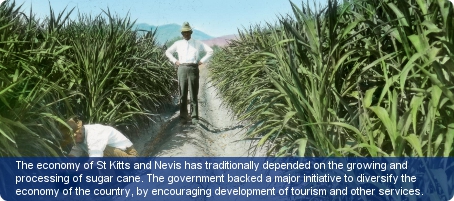Find a business in St Kitts and Nevis

The two-island state of St Kitts and Nevis in the Eastern Caribbean has diversified its economy from one based solely on sugar, to one where tourism has become the largest source of foreign exchange over the last 40 years. Sugar production ceased in 2005 and along with the tourism sector, small-scale industrialisation has been achieved. Electronics assembly, food-processing, and beverages and clothing production have all been developed. St Kitts and Nevis has a GNI per capita of US$13,610 (2012) and has seen GDP growth of 0.8% per annum (2008-12). But like other tourist destinations in the Caribbean, it is vulnerable to damage from natural disasters and shifts in tourism demand.
The services sector contributes 75% of GDP, while the agriculture sector only contributes 2% (2010). In 2011 the direct contribution of travel and tourism to the GDP of St Kitts and Nevis was 7.5%, generating 2,000 jobs – 7.4% of total employment (World Travel and Tourism estimate). The country was ranked 4th in the British Airways top holidays destinations, and was estimated by the World Travel and Tourism Council to be positioned 19th out of 181 countries for relative contribution of tourism to the national economy (2011). Successful attractions of the country’s tourism industry include leisure pursuits, wildlife, beaches, relaxation and ecotourism.
Off-shore banking and financial services have grown rapidly with Nevis becoming home to over 20,000 off-shore companies. In addition, the islands have become home to the offshore campuses of two major US educational institutions – The Ross University School of Veterinary Medicine has a campus on St Kitts, and Berne University – a US postgraduate distance-learning organisation – has had a campus on Nevis since 1992.
While sugar had been the traditional mainstay of the St Kitts economy until the 1970s, the government finally closed the sugar industry following the 2005 harvest. This came about after decades of losses at the state-run sugar company. To compensate, the government has embarked on a programme to diversify the agricultural sector and to stimulate other sectors of the economy.
St Kitts and Nevis has a good road network of approximately 320 km, 43% of which are paved. Basseterre, the capital, has a large deep-water port which offers berthing facilities for cruise ships and cargo vessels, whilst smaller ports are also present at Sandy Point and Newcastle. The Robert Llewellyn Bradshaw International Airport is located at Golden Rock, in close proximity to Basseterre, and receives direct flights from the USA and Canada.
The two-island state is ranked 16th in the world for dealing with construction permits, according to the World Bank’s ‘Doing Business 2012’ study. Overall, it is placed 95th for the ease of doing business. These rankings measure the conduciveness of a regulatory regime in starting and operating a business.
St Kitts and Nevis has a 97.8% literacy rate (2006) and English is the official language. The most recent survey by the International Labour Organisation found that the country has a 74.9% labour force participation rate. 24.8% of the labour force is employed in community, social, and personal services. This is followed by 19.7% employment in retail, restaurants, and hotels. In comparison, the smallest industry is agriculture, hunting, forestry, and fishing, which employs only 0.2% of the labour force.



